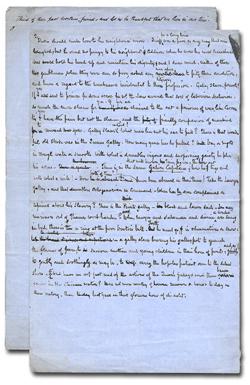
Thackeray, William Makepeace. (1811-1863) British novelist, works include "Vanity Fair" (1847-8), "Pendennis" (1848), and "The Newcomes" (1853-5).
Autograph Manuscript Leaf from Thackeray's Roundabout Papers. One page, tall Octavo, on blue bond, n.d., n.p. Being a manuscript leaf in Thackeray's hand from "On a Joke Which I Once Heard From the Late Thomas Hood," which appeared in his "Roundabout Papers," the name given to a series of humorous essays published in Cornhill magazine, of which Thackeray was the editor. The page, which contains a complete narrative, relates a witty anecdote that lampoons the poverty of his greatest literary forbears, Jonathan Swift, Laurence Sterne, and Joseph Addison, to satirize English upper-class values. It begins :
"Sterne should make love to his neighbors' wives. Swift for a long time was as poor as any wag that ever laughed, but he owed no penny to his neighbors. Addison when he wore his most threadbare would hold his head up and maintain his dignity:and, I dare vouch, neither of those [two] gentlemen, when they were ever so poor, asked any man alive to pity their condition, and have a regard to the weaknesses incidental to the literary profession. Galley slave, forsooth! If you are sent to prision for some error for which the law awards that sort of laborious seclusion, so much the more [ ? ] for you. If you are chained to the oar a prisioner of war, like Cervantes, and you have the pain but not the [pleasure?], and the friendly companion of mankind to reward you. Galley slaves, indeed! What man has not his oar to pull? ...Take the lawyer galley, and that dauntless octogenarian in command. When has he ever complained or repined about his slavery?There is the Priests galley - black and [ ? ] sails - see any mariners out of Thames work harder?..."
Approximately 300 words, with numerous corrections, in Thackeray's hand. A sardonic line on the verso of the manuscript leaf sums up the sentiment of Thackeray's tidy satire: "Think of these past worthies, friend, and let us be thankful that we live in our time."
The essay, of which this manuscript represents a first draft, was published in Thackeray's "Roundabout Papers" No. 9, December, 1860. In this year, Thackeray had already published Vanity Fair: he was at the height of his powers, and enjoyed a reputation as one of the greatest living English authors, the equal of Charles Dickens, with whom he was friends. Thackeray's" Roundabout Papers" were often autobiographical, and sometimes the author used them to respond to literary attacks.
Very Fine.
Estimated Value $650-800.
